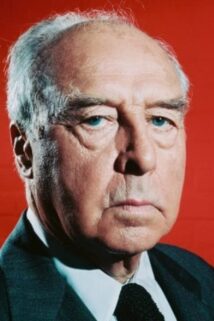John Houseman
Academy Award-winning actor John Houseman's main contribution to American culture was not his own performances on film but rather, his role as a midwife to one of the greatest actor-directors-cinematic geniuses his adopted country ever produced (Orson Welles) and as a midwife to a whole generation of actors as head of the drama division of the Juilliard School.
Houseman was born Jacques Haussmann on September 22, 1902 in Bucharest, Romania, to May (Davies) and Georges Haussmann, who ran a grain business. His father was from an Alsatian Jewish family, and his mother, who was British, was of Welsh and Irish descent. John was raised in England, where he was educated. He emigrated to America in 1925, establishing himself in New York City, where he directed "Four Saints in Three Acts" for the theater in 1934. He founded the Mercury Theatre along with Orson Welles (whom he affectionately called "The Dog-Faced Boy"). Their most important success was a modern-dress version of Shakespeare's "Julius Caesar", in which the spectre of Hitler and Mussolini's Fascist states were evoked.
As a producer assigned to Unit 891 of the Federal Theater Project funded by the government's Works Progress Administration, he produced the legendary production "Cradle Will Rock", a musical about the tyranny of capitalism, with music by Marc Blitzstein, creative input from Welles, and starring leftists Howard Da Silva and Will Geer. The production was so controversial, it was banned before its debut, although the did manage to stage one performance. On Broadway, apart from the Mercury Theatre and the WPA, Houseman directed "The Devil and Daniel Webster" (1939) and "Liberty Jones" and produced "Native Son" (1941). During World War II, Houseman went to work for the Office of War Information and was involved in broadcasting radio propaganda for the Voice of America. After the war, Houseman returned to directing and produced Metro-Goldwyn-Mayer's version of Julius Caesar (1953).
He had produced his first film, Orson Welles' Too Much Johnson (1938), while with the Mercury Theatre. He was involved with the pre-production of Citizen Kane (1941) but fell out with Welles due to Welles' already legendary ego. He produced a score of major films and was involved in three television series before devoting his life to teaching. He helped establish the acting program at New York's famous Julliard School for the Arts, where he influenced a new generation of actors. Ironically, he had appeared in only one major movie, in a supporting role, before being tapped to replace James Mason in The Paper Chase (1973). He won an Academy Award for the role and began a 15-year career as a highly sought after supporting player.
John Houseman, who wrote three volumes of memoirs, "Run-Through" (1972), "Front and Center" (1979) and "Final Dress" (1983), died at age 86 on October 31, 1988 after making major contributions to the theater and film.

